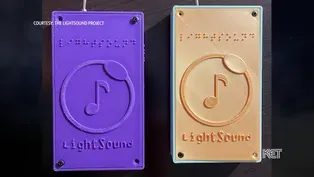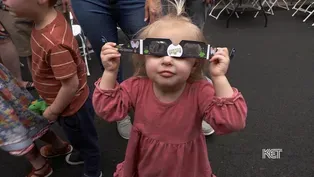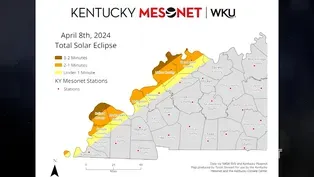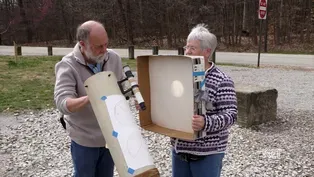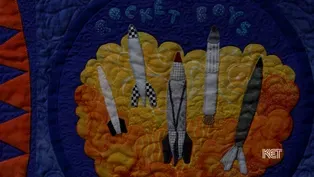Eclipse 2024: A KET Special Report
NASA’s Eclipse Experiments and How We Might Benefit Down Here on Earth
Clip: 4/8/2024 | 3m 38sVideo has Closed Captions
NASA’s eclipse experiments and how we might benefit down here on Earth.
NASA launched rockets during Monday's eclipse, all for the sake of science. Our Christie Dutton finds out what NASA hopes to learn from these eclipse experiments and how we might benefit down here on Earth.
Problems with Closed Captions? Closed Captioning Feedback
Problems with Closed Captions? Closed Captioning Feedback
Eclipse 2024: A KET Special Report is a local public television program presented by KET
Eclipse 2024: A KET Special Report
NASA’s Eclipse Experiments and How We Might Benefit Down Here on Earth
Clip: 4/8/2024 | 3m 38sVideo has Closed Captions
NASA launched rockets during Monday's eclipse, all for the sake of science. Our Christie Dutton finds out what NASA hopes to learn from these eclipse experiments and how we might benefit down here on Earth.
Problems with Closed Captions? Closed Captioning Feedback
How to Watch Eclipse 2024: A KET Special Report
Eclipse 2024: A KET Special Report is available to stream on pbs.org and the free PBS App, available on iPhone, Apple TV, Android TV, Android smartphones, Amazon Fire TV, Amazon Fire Tablet, Roku, Samsung Smart TV, and Vizio.
Providing Support for PBS.org
Learn Moreabout PBS online sponsorshipFrom hard core scientists to backyard enthusiasts and even microbreweries.
It seems like the entire country was anticipating today's event.
Over the next 30 minutes, we'll discuss how the eclipse is impacting places like here in Paducah and what experts are looking for during this rare phenomenon.
That begins with Nassau, which launched rockets during today's eclipse, all for the sake of science.
Our Christy Dalton finds out what Nassau hopes to learn from these eclipse experiments and how we might benefit down here on Earth.
While many of us will have our sights set on the sky, scientists across the U.S. will have their sights set on discovering something new from this eclipse.
Joining us now is Dr. Lisa Winter from NASA.
Dr. Winter, thank you for being here.
Okay.
What is NASA hoping to find out from this celestial event?
And so we have a number of science experiments going on during the eclipse to study the solar corona.
One thing about the eclipses, we can study the very inner solar corona, which you can't see except during an eclipse.
And we're going to study ionospheric effects.
So that is an outer layer of the atmosphere that conducts electricity is very important to space weather.
And we have a number of projects going to to study both of those phenomena.
Well, how do you study the ionosphere?
How are you all going to conduct that experiment?
Yeah, we have a really great experiment that is going to send up three rockets from Wallops Island in Virginia.
The rockets are going to go up before the eclipse, slightly before the eclipse, during the eclipse and then slightly after the eclipse.
They're going to have a scientific payload on there that separates and measures the temperature and the density in in the atmosphere in the ionosphere.
And they're coordinating it with balloons as well.
So there'll be balloons and and rocket payloads that that are going to track temperatures and densities and look for ripples in the ionosphere during the eclipse.
So what will those scientific measurements tell us?
What will how will that help us?
Yeah, that's a great question.
So the ionosphere is really important to space weather.
If there is a big solar storm, it causes basically a current through the ionosphere that can induce currents further down.
So any kind of long conducting wire like our power grids or oil pipelines, they're going to be affected by solar storms and these currents that are in the ionosphere, they can cause blackouts.
There's been a really widespread blackout in 1989 in Quebec that was caused by a solar storm.
And so we want to understand this process better.
Also, the ionosphere is important for high frequency communications.
So if aircraft are flying, for instance, over the ocean, they need to use the ionosphere to communicate.
So they can have blackouts during solar storms.
So So this kind of research will help us to understand all of those effects better.
The next total solar eclipse in the US is not until 2044.
So these experiments are rare opportunity for NASA's scientists to collect data that could predict disruptions in wireless communication networks.
Device Tested in Kentucky Allows Blind or Visually Impaired to Experience Solar Eclipses
Video has Closed Captions
Device tested in Kentucky allows blind or visually impaired to experience solar eclipses. (4m 30s)
In the Path of Totality, Paducah celebrates the 2024 Total Solar Eclipse Event
Video has Closed Captions
How the city of Paducah is celebrating the historic 2024 solar eclipse event. (2m 23s)
Kentucky Breweries Partner to Make Special Beers for the 2024 Solar Eclipse
Video has Closed Captions
Kentucky breweries partner to make special beers for the 2024 Solar Eclipse. (2m 51s)
Kentucky Mesonet and Climate Center Track Weather Changes Created by the Eclipse
Video has Closed Captions
Kentucky Mesonet and Climate Center track weather changes created by the eclipse. (3m 2s)
Meet a Kentucky Stargazer Who was Ready to Go the Distance for the Eclipse
Video has Closed Captions
Meet a Kentucky stargazer who was ready to go the distance for the celestial show. (2m 45s)
Why An Astronaut's Work is Being Showcased at the National Quilt Museum
Video has Closed Captions
Why an astronaut's work is being showcased at the National Quilt Museum. (4m 1s)
Providing Support for PBS.org
Learn Moreabout PBS online sponsorshipEclipse 2024: A KET Special Report is a local public television program presented by KET
